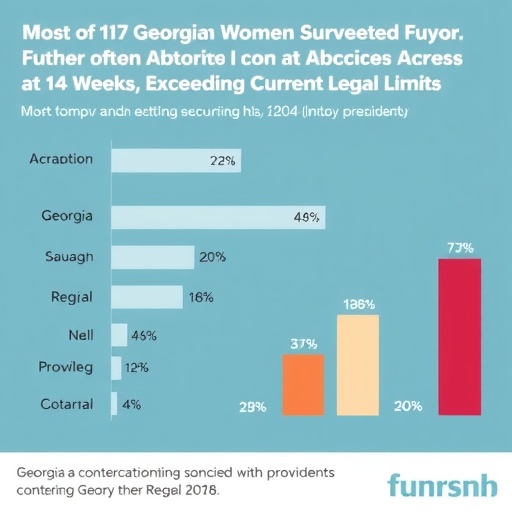In a comprehensive new survey study published in the open-access journal PLOS One, researchers have provided important insights into the complex and evolving views on abortion legality among reproductive-aged women living in Georgia, USA. Conducted by Stephanie Eick from Emory University and colleagues, the study sheds light on how abortion support varies not only by gestational age but also by political, religious, and geographic factors. This timely investigation arrives amid ongoing debates and stringent state-level abortion restrictions, including Georgia’s current law that restricts abortion access after six weeks of pregnancy—a policy effective since July 2022.
The study surveyed 177 English-speaking women aged between 18 and 40 who reside in Georgia, recruiting participants via targeted social media advertisements. The primary aim was to examine the nuanced perspectives these women hold regarding abortion legality both generally and at specific gestational points: six, fourteen, and twenty-four weeks. This approach allowed the researchers to capture views not only on broad principles of abortion rights but also on specific time frames that carry significant legal, ethical, and medical implications.
Overall, the findings revealed a strong general support for abortion rights within the sample, with 84% of women endorsing abortion being legal in all or most cases. However, this general support did not translate uniformly across different gestational ages. At six weeks—the legal limit currently enforced by Georgia law—support was slightly lower but still substantial, with 76% backing access. At fourteen weeks, support dipped further to 60%, and by twenty-four weeks, a time close to fetal viability when medical and ethical debates intensify, only 31% supported legal abortion access.
One of the most striking aspects of the study is the role of political ideology in shaping abortion views. Women identifying as conservative or moderate reported significantly higher odds—approximately tenfold—of viewing abortion as generally illegal compared to liberal-identifying women. This sharp contrast aligns with broader national trends highlighting deep polarization in abortion opinions based on political alignment. The researchers note that political identity remains a key determinant in abortion attitudes among women of reproductive age even within a single state.
Religious engagement similarly influenced opinions. Participants who attended weekly religious services were about seven times more likely to believe abortion should be illegal. This emphasizes the powerful role religion continues to play in shaping moral and ethical stances on reproductive rights. The findings underscore how religiosity intersects with political views, amplifying resistance to abortion access among certain subgroups.
Geographic location within Georgia also shaped abortion views substantially. Women living outside of the Atlanta metropolitan area—typically more urban and politically liberal—were six times more likely to oppose abortion legality or express conditional support (“it depends”) compared to their metro area counterparts. This geographic divergence reveals how urban-rural divides inform attitudes toward abortion, reflecting differing cultural, economic, and social contexts.
Interestingly, although these group differences were pronounced for general abortion support and support at six and fourteen weeks, the divergence dissipated significantly by twenty-four weeks. At this gestational age, the typical threshold of fetal viability, there appeared to be greater consensus among participants regardless of political, religious, or geographic background, with diminished polarization in attitudes. This finding suggests that views harden around central ethical concerns related to fetal development stages and viability.
The research team is careful to note limitations inherent to their study. The sample size was relatively modest and skewed, with participants predominantly liberal and concentrated in metropolitan Atlanta. Such sampling bias, potentially exacerbated by recruitment via social media, limits the broad applicability of results to the entire population of reproductive-aged women in Georgia or the United States. Despite these constraints, the study provides vital insights, particularly for policymakers and advocates seeking to understand grassroots attitudes toward abortion within highly regulated states.
Additionally, while the study extensively captures opinions about abortion legality at distinct pregnancy stages, it did not directly ask participants about their views on the state’s current policy restricting abortion access beyond six weeks. This gap represents an opportunity for future research to more explicitly elicit public opinions about such restrictive laws and their perceived impact on women’s health and rights.
Taken together, the findings portray abortion views among reproductive-age women in Georgia as nuanced and dynamic, shaped by intersecting factors such as gestational timelines, political and religious identity, and geographic setting. The majority voice general support for abortion rights, with declining endorsement of abortion legality as pregnancy progresses. At the same time, the trends illuminate significant divisions influenced by socio-political and cultural identities that remain entrenched and may inform future legislative conflict.
This study adds a critical component to the growing body of research documenting reproductive health attitudes in the post-Roe v. Wade landscape, especially in states with strict abortion laws. Understanding these views with more granularity can better inform public discourse, healthcare provision, and policy interventions aimed at meeting the needs and perspectives of women in diverse communities.
As legal battles around abortion continue nationwide, studies like this provide evidence-based reflections of how women themselves perceive abortion access and its limitations. These nuanced opinions, situated within contextual factors of ideology, religion, and place, complicate simplistic narratives of support or opposition, underscoring the complexity of public sentiment on one of modern society’s most contentious issues.
Ultimately, the research highlights the importance of continued efforts to include diverse voices in the abortion conversation, revealing both widespread support for reproductive rights and the complexities underlying opinion formation in an era marked by significant legal and social change.
Subject of Research: Not explicitly stated in detail beyond survey research on abortion views.
Article Title: Determinants of abortion views among reproductive age women in Georgia 2023–2024
News Publication Date: 12-Nov-2025
Web References: http://dx.doi.org/10.1371/journal.pone.0335370
References: Chandler M, Darville JA, Eick SM (2025) Determinants of abortion views among reproductive age women in Georgia 2023–2024. PLoS One 20(11): e0335370.
Image Credits: Not provided
Keywords: Abortion views, reproductive age women, Georgia, abortion legality, gestational age, political ideology, religious attendance, geographic variation, survey research, fetal viability, abortion policy




